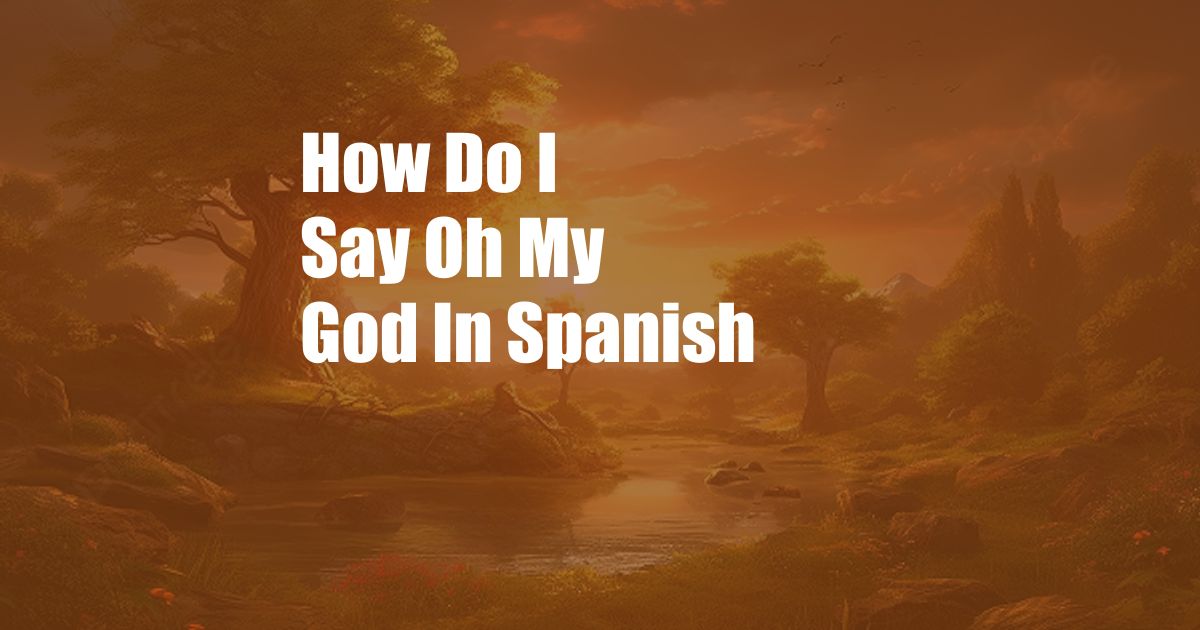
How Do I Say “Oh My God” in Spanish?
As I strolled through the bustling streets of Madrid, the vibrant energy and chatter of the locals permeated the air. I was eager to immerse myself in the culture and communicate with the friendly people I encountered. However, I stumbled upon a linguistic hurdle when I wanted to express my surprise or amazement – I didn’t know how to say “Oh my god” in Spanish.
My initial attempts were met with blank stares and confusion. Determined to overcome this communication barrier, I embarked on a quest to uncover the local vernacular for this common exclamation.
Spanish Expressions for Exclamation
In the Spanish language, there is a rich tapestry of expressions used to convey surprise, amazement, and disbelief. The most common translation for “Oh my god” is “Dios mío,” literally meaning “My God.”
However, there are several other expressions that carry similar connotations, each with its unique nuances. Here are a few commonly used alternatives:
- Madre mía: Literally translates to “My mother,” this expression conveys a sense of astonishment or exasperation.
- ¡Caramba!: This exclamation is often used to express surprise or mild annoyance.
- ¡Ay, Dios!: A more emphatic expression that translates to “Oh, God!”
Definition, History, and Meaning
The expression “Oh my god” is a universal exclamation that transcends cultural and linguistic boundaries. It is a spontaneous utterance that conveys a range of emotions, from shock and awe to disbelief and dismay.
Its origins can be traced back to ancient times, where people would invoke the name of their deities in moments of extreme surprise or emotion. In the Spanish language, the expression “Dios mío” has been used for centuries, reflecting the strong influence of Catholicism on Spanish culture.
Usage and Context
The expressions for “Oh my god” in Spanish are commonly used in informal settings, among friends, family, and acquaintances. They are typically uttered in response to unexpected events, startling news, or moments of great excitement.
It’s important to note that the level of formality and intensity of these expressions varies depending on the context. For instance, “Dios mío” is generally considered to be more solemn and respectful than “Madre mía,” which may be used in more casual situations.
Tips and Expert Advice for Using These Expressions
To use these expressions like a native Spanish speaker, consider the following tips:
- Use them sparingly: While these expressions can be effective in conveying surprise, overuse can diminish their impact.
- Choose the right expression: Consider the context and the level of formality when selecting the most appropriate expression.
- Practice pronunciation: To avoid misinterpretation, practice pronouncing these expressions correctly.
Additionally, it’s recommended to seek guidance from a native Spanish speaker or language teacher for accurate pronunciation and usage.
Frequently Asked Questions (FAQs)
Q: What is the difference between “Dios mío” and “Madre mía”?
A: “Dios mío” is a more formal and respectful expression, while “Madre mía” is more commonly used in informal settings.
Q: Can I use these expressions in any situation?
A: It’s generally best to use these expressions in informal situations, among friends and acquaintances.
Conclusion
Unlocking the secrets of expressing surprise in Spanish is essential for seamless communication and cultural immersion. The expressions “Dios mío,” “Madre mía,” “¡Caramba!,” and “¡Ay, Dios!” provide a rich palette of options to convey your emotions in a natural and authentic way.
Whether you are a seasoned traveler or a curious language learner, I encourage you to embrace the nuances of these expressions and use them with confidence. By doing so, you will not only enhance your ability to communicate in Spanish but also gain a deeper appreciation for the vibrant and expressive nature of the language.
Are you interested in learning more about the fascinating world of Spanish language and culture?